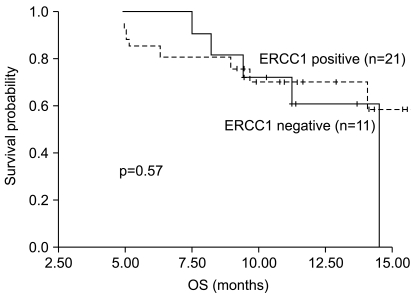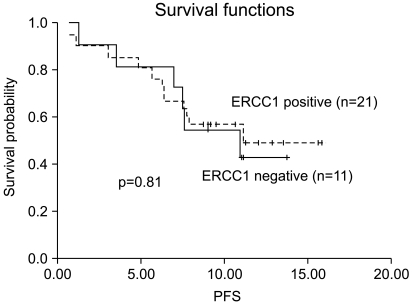Cancer Res Treat.
2010 Jun;42(2):101-106.
Predictive Value of the ERCC1 Expression for Treatment Response and Survival in Advanced Gastric Cancer Patients Receiving Cisplatin-based First-line Chemotherapy
- Affiliations
-
- 1Department of Medicine, Sungkyunkwan University Samsung Medical Center, Seoul, Korea. hematoma@skku.edu
- 2Department of Diagnostic Pathology, Sungkyunkwan University Samsung Medical Center, Seoul, Korea.
Abstract
- PURPOSE
The aim of this study was to determine whether the ERCC1 expression is effective to predict the clinical outcomes of patients with advanced gastric cancer (AGC) and who were treated with cisplatin-based first-line chemotherapy.
MATERIALS AND METHODS
A total of 89 measurable AGC patients received cisplatin and capecitabine, with or without epirubicin, as a part of a randomized phase II study. Patients were included for the current molecular analysis if they had received two or more cycles of chemotherapy, their objective tumor responses were measured and if their paraffin-embedded tumor samples were available. The ERCC1 expression was examined by performing immunohistochemical (IHC) staining, and the patients were divided into two groups (positive or negative) according to the presence of IHC staining of the tumor cell nuclei.
RESULTS
Of the 32 eligible patients, 21 patients (66%) had tumor with a positive expression of ERCC1 and the remaining 11 patients had tumor with a negative ERCC1-expression. The ERCC1-negative patients achieved a higher response rate than that of the ERCC1-positive patients (44% vs. 28%, respectively), although the difference was not statistically significant (p=0.42). The median survival time for the all patients was 14.6 months (95% CI: 13.6 to 15.6 months). The one-year survival rate was similar for the ERCC1-negative patients (61%) and the ERCC1-positive patients (70%).
CONCLUSION
In the current study, the tumor ERCC1 expression by IHC staining could not predict the clinical response or survival of AGC patients who were treated with cisplatin-based first-line chemotherapy. The ERCC1 protein expression does not appear to be a useful tool for the selection of tailored chemotherapy for these patients.
MeSH Terms
Figure
Reference
-
1. Won YJ, Sung J, Jung KW, Kong HJ, Park S, Shin HR, et al. Nationwide Cancer Incidence in Korea, 2003-2005. Cancer Res Treat. 2009; 41:122–131. PMID: 19809561.
Article2. Wagner AD, Grothe W, Haerting J, Kleber G, Grothey A, Fleig WE. Chemotherapy in advanced gastric cancer: a systematic review and meta-analysis based on aggregate data. J Clin Oncol. 2006; 24:2903–2909. PMID: 16782930.
Article4. Reed E. Platinum-DNA adduct, nucleotide excision repair and platinum based anti-cancer chemotherapy. Cancer Treat Rev. 1998; 24:331–344. PMID: 9861196.
Article5. Bepler G, Gautam A, McIntyre LM, Beck AF, Chervinsky DS, Kim YC, et al. Prognostic significance of molecular genetic aberrations on chromosome segment 11p15.5 in non-small-cell lung cancer. J Clin Oncol. 2002; 20:1353–1360. PMID: 11870179.
Article6. Mu D, Hsu DS, Sancar A. Reaction mechanism of human DNA repair excision nuclease. J Biol Chem. 1996; 271:8285–8294. PMID: 8626523.
Article7. Sancar A. Mechanisms of DNA excision repair. Science. 1994; 266:1954–1956. PMID: 7801120.
Article8. Zamble DB, Mu D, Reardon JT, Sancar A, Lippard SJ. Repair of cisplatin--DNA adducts by the mammalian excision nuclease. Biochemistry. 1996; 35:10004–10013. PMID: 8756462.
Article9. De Silva IU, McHugh PJ, Clingen PH, Hartley JA. Defining the roles of nucleotide excision repair and recombination in the repair of DNA interstrand cross-links in mammalian cells. Mol Cell Biol. 2000; 20:7980–7990. PMID: 11027268.
Article10. Niedernhofer LJ, Odijk H, Budzowska M, van Drunen E, Maas A, Theil AF, et al. The structure-specific endonuclease Ercc1-Xpf is required to resolve DNA interstrand cross-link-induced double-strand breaks. Mol Cell Biol. 2004; 24:5776–5787. PMID: 15199134.
Article11. Sargent RG, Meservy JL, Perkins BD, Kilburn AE, Intody Z, Adair GM, et al. Role of the nucleotide excision repair gene ERCC1 in formation of recombination-dependent rearrangements in mammalian cells. Nucleic Acids Res. 2000; 28:3771–3778. PMID: 11000269.
Article12. Olaussen KA, Dunant A, Fouret P, Brambilla E, Andre F, Haddad V, et al. DNA repair by ERCC1 in non-small-cell lung cancer and cisplatin-based adjuvant chemotherapy. N Engl J Med. 2006; 355:983–991. PMID: 16957145.
Article13. Simon GR, Ismail-Khan R, Bepler G. Nuclear excision repair-based personalized therapy for non-small cell lung cancer: from hypothesis to reality. Int J Biochem Cell Biol. 2007; 39:1318–1328. PMID: 17600754.
Article14. Viguier J, Boige V, Miquel C, Pocard M, Giraudeau B, Sabourin JC, et al. ERCC1 codon 118 polymorphism is a predictive factor for the tumor response to oxaliplatin/5-fluorouracil combination chemotherapy in patients with advanced colorectal cancer. Clin Cancer Res. 2005; 11:6212–6217. PMID: 16144923.
Article15. Zheng Z, Chen T, Li X, Haura E, Sharma A, Bepler G. DNA synthesis and repair genes RRM1 and ERCC1 in lung cancer. N Engl J Med. 2007; 356:800–808. PMID: 17314339.16. Yun J, Lee J, Park SH, Park JO, Park YS, Lim HY, et al. A randomised phase II study of combination chemotherapy with epirubicin, cisplatin and capecitabine (ECX) or cisplatin and capecitabine (CX) in advanced gastric cancer (AGC). Eur J Cancer. 2010; 46:885–891. PMID: 20060288.17. Ohtsu A, Yoshida S, Saijo N. Disparities in gastric cancer chemotherapy between the East and West. J Clin Oncol. 2006; 24:2188–2196. PMID: 16682738.
Article18. Metzger R, Leichman CG, Danenberg KD, Danenberg PV, Lenz HJ, Hayashi K, et al. ERCC1 mRNA levels complement thymidylate synthase mRNA levels in predicting response and survival for gastric cancer patients receiving combination cisplatin and fluorouracil chemotherapy. J Clin Oncol. 1998; 16:309–316. PMID: 9440758.
Article19. Britten RA, Liu D, Tessier A, Hutchison MJ, Murray D. ERCC1 expression as a molecular marker of cisplatin resistance in human cervical tumor cells. Int J Cancer. 2000; 89:453–457. PMID: 11008208.
Article20. Codegoni AM, Broggini M, Pitelli MR, Pantarotto M, Torri V, Mangioni C, et al. Expression of genes of potential importance in the response to chemotherapy and DNA repair in patients with ovarian cancer. Gynecol Oncol. 1997; 65:130–137. PMID: 9103402.
Article21. Shirota Y, Stoehlmacher J, Brabender J, Xiong YP, Uetake H, Danenberg KD, et al. ERCC1 and thymidylate synthase mRNA levels predict survival for colorectal cancer patients receiving combination oxaliplatin and fluorouracil chemotherapy. J Clin Oncol. 2001; 19:4298–4304. PMID: 11731512.22. Kwon HC, Roh MS, Oh SY, Kim SH, Kim MC, Kim JS, et al. Prognostic value of expression of ERCC1, thymidylate synthase, and glutathione S-transferase P1 for 5-fluorouracil/oxaliplatin chemotherapy in advanced gastric cancer. Ann Oncol. 2007; 18:504–509. PMID: 17322540.
Article23. Wang X, Zhao J, Yang L, Mao L, An T, Bai H, et al. Positive expression of ERCC1 predicts a poorer platinum-based treatment outcome in Chinese patients with advanced non-small-cell lung cancer. Med Oncol. 2009; (in press).
Article24. Toiyama Y, Inoue Y, Hiro J, Ojima E, Watanabe H, Narita Y, et al. The range of optimal concentration and mechanisms of paclitaxel in radio-enhancement in gastrointestinal cancer cell lines. Cancer Chemother Pharmacol. 2007; 59:733–742. PMID: 16957932.
Article25. Smith S, Su D, Rigault de la Longrais IA, Schwartz P, Puopolo M, Rutherford TJ, et al. ERCC1 genotype and phenotype in epithelial ovarian cancer identify patients likely to benefit from paclitaxel treatment in addition to platinum-based therapy. J Clin Oncol. 2007; 25:5172–5179. PMID: 18024864.
Article
- Full Text Links
- Actions
-
Cited
- CITED
-
- Close
- Share
- Similar articles
-
- An Analysis of HER-2/neu, ERCC1, and GST-pi in Advanced Non-Small Cell Lung Cancer Patients Who are Treated with Platinum-based Chemotherapy
- ERCC1 Expression-Based Randomized Phase II Study of Gemcitabine/Cisplatin Versus Irinotecan/Cisplatin in Patients with Advanced Non-small Cell Lung Cancer
- Relation between ERCC1 Expression in Sputum and Survival after Cisplatin-Based Chemotherapy in Patients with Non-Small Cell Lung Cancer
- Increased ERCC Expression Correlates with Improved Outcome of Patients Treated with Cisplatin as an Adjuvant Therapy for Curatively Resected Gastric Cancer
- Combination chemotherapy with docetaxel and cisplatin as first-line treatment in advanced gastric cancer: is it a new effective chemotherapy?



